目的论视角下的政治性文件的英译--以2014年《政府工作报告》英译本为例
目的论视角下《政府工作报告》中译英研究
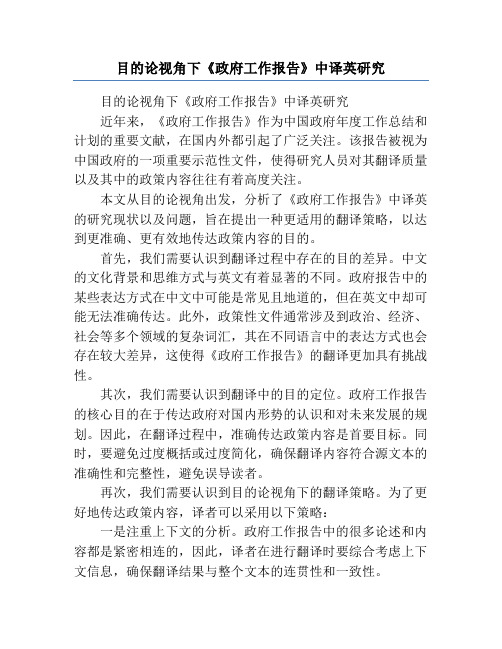
目的论视角下《政府工作报告》中译英研究目的论视角下《政府工作报告》中译英研究近年来,《政府工作报告》作为中国政府年度工作总结和计划的重要文献,在国内外都引起了广泛关注。
该报告被视为中国政府的一项重要示范性文件,使得研究人员对其翻译质量以及其中的政策内容往往有着高度关注。
本文从目的论视角出发,分析了《政府工作报告》中译英的研究现状以及问题,旨在提出一种更适用的翻译策略,以达到更准确、更有效地传达政策内容的目的。
首先,我们需要认识到翻译过程中存在的目的差异。
中文的文化背景和思维方式与英文有着显著的不同。
政府报告中的某些表达方式在中文中可能是常见且地道的,但在英文中却可能无法准确传达。
此外,政策性文件通常涉及到政治、经济、社会等多个领域的复杂词汇,其在不同语言中的表达方式也会存在较大差异,这使得《政府工作报告》的翻译更加具有挑战性。
其次,我们需要认识到翻译中的目的定位。
政府工作报告的核心目的在于传达政府对国内形势的认识和对未来发展的规划。
因此,在翻译过程中,准确传达政策内容是首要目标。
同时,要避免过度概括或过度简化,确保翻译内容符合源文本的准确性和完整性,避免误导读者。
再次,我们需要认识到目的论视角下的翻译策略。
为了更好地传达政策内容,译者可以采用以下策略:一是注重上下文的分析。
政府工作报告中的很多论述和内容都是紧密相连的,因此,译者在进行翻译时要综合考虑上下文信息,确保翻译结果与整个文本的连贯性和一致性。
二是尊重受众的语言习惯和理解水平。
政府工作报告的受众除了国内的政策制定者和相关机构外,还包括了国际社会的读者。
因此,译者需要根据不同的受众背景,采取恰当的表达方式和术语,以使翻译结果更易理解和接受。
三是灵活运用翻译技巧。
政府工作报告中常出现的政策性语言和表达方式对于译者来说是一大挑战。
译者可以运用翻译技巧如同义转换、增减信息、注释等,以准确传达政策内容。
最后,我们需要认识到翻译工作的不可完美性。
无论是从源语言到目标语言的语言特点差异,还是政府工作报告中复杂的政策性表达,都可能导致翻译不尽人意。
切斯特曼翻译伦理视角下政府工作报告英译研究
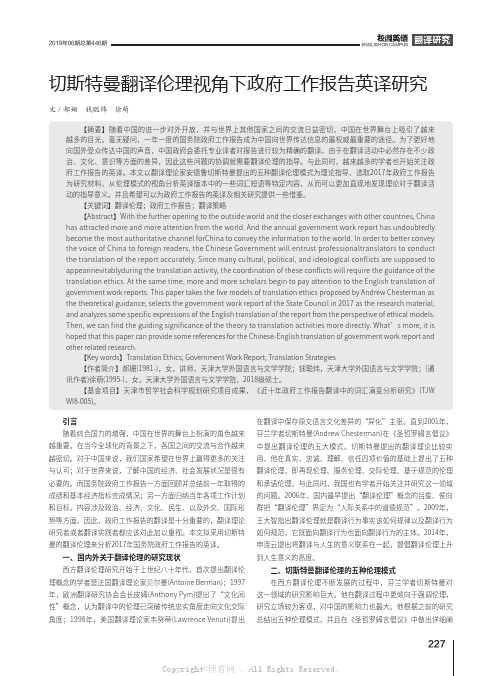
227切斯特曼翻译伦理视角下政府工作报告英译研究文/郝姗 钱聪炜 徐萌【摘要】随着中国的进一步对外开放,并与世界上其他国家之间的交流日益密切,中国在世界舞台上吸引了越来越多的目光。
毫无疑问,一年一度的国务院政府工作报告成为中国向世界传达信息的最权威最重要的途径。
为了更好地向国外受众传达中国的声音,中国政府会委托专业译者对报告进行较为精确的翻译。
由于在翻译活动中必然存在不少政治、文化、意识等方面的差异,因此这些问题的协调就需要翻译伦理的指导。
与此同时,越来越多的学者也开始关注政府工作报告的英译。
本文以翻译理论家安德鲁切斯特曼提出的五种翻译伦理模式为理论指导,选取2017年政府工作报告为研究材料,从伦理模式的视角分析英译版本中的一些词汇短语等特定内容,从而可以更加直观地发现理论对于翻译活动的指导意义。
并且希望可以为政府工作报告的英译及相关研究提供一些借鉴。
【关键词】翻译伦理;政府工作报告;翻译策略【Abstract】With the further opening to the outside world and the closer exchanges with other countries, Chinahas attracted more and more attention from the world. And the annual government work report has undoubtedly become the most authoritative channel forChina to convey the information to the world. In order to better convey the voice of China to foreign readers, the Chinese Government will entrust professionaltranslators to conduct the translation of the report accurately. Since many cultural, political, and ideological conflicts are supposed toappearinevitablyduring the translation activity, the coordination of these conflicts will require the guidance of the translation ethics. At the same time, more and more scholars begin to pay attention to the English translation of government work reports. This paper takes the five models of translation ethics proposed by Andrew Chesterman as the theoretical guidance, selects the government work report of the State Council in 2017 as the research material, and analyzes some specific expressions of the English translation of the report from the perspective of ethical models. Then, we can find the guiding significance of the theory to translation activities more directly. What’s more, it is hoped that this paper can provide some references for the Chinese-English translation of government work report and other related research.【Key words】Translation Ethics; Government Work Report; Translation Strategies【作者简介】郝姗(1981-),女,讲师,天津大学外国语言与文学学院;钱聪炜,天津大学外国语言与文学学院;(通讯作者)徐萌(1995-),女,天津大学外国语言与文学学院,2018级硕士。
目的论指导下政治类新闻汉译
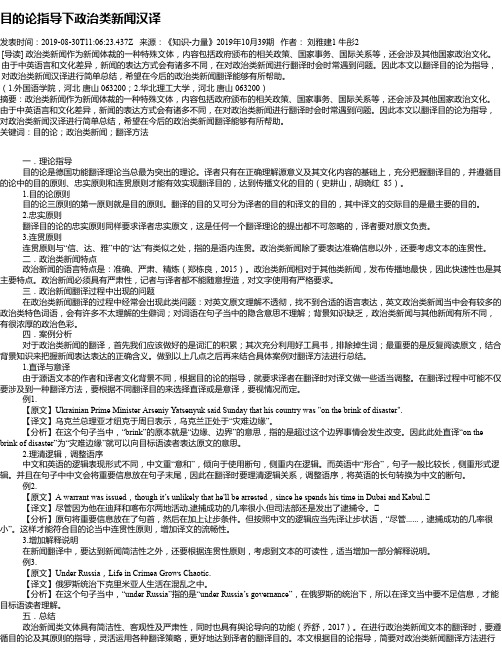
目的论指导下政治类新闻汉译发表时间:2019-08-30T11:06:23.437Z 来源:《知识-力量》2019年10月39期作者:刘雅建1 牛彤2[导读] 政治类新闻作为新闻体裁的一种特殊文体,内容包括政府颁布的相关政策、国家事务、国际关系等,还会涉及其他国家政治文化。
由于中英语言和文化差异,新闻的表达方式会有诸多不同,在对政治类新闻进行翻译时会时常遇到问题。
因此本文以翻译目的论为指导,对政治类新闻汉译进行简单总结,希望在今后的政治类新闻翻译能够有所帮助。
(1.外国语学院,河北唐山 063200;2.华北理工大学,河北唐山 063200)摘要:政治类新闻作为新闻体裁的一种特殊文体,内容包括政府颁布的相关政策、国家事务、国际关系等,还会涉及其他国家政治文化。
由于中英语言和文化差异,新闻的表达方式会有诸多不同,在对政治类新闻进行翻译时会时常遇到问题。
因此本文以翻译目的论为指导,对政治类新闻汉译进行简单总结,希望在今后的政治类新闻翻译能够有所帮助。
关键词:目的论;政治类新闻;翻译方法一.理论指导目的论是德国功能翻译理论当总最为突出的理论。
译者只有在正确理解源意义及其文化内容的基础上,充分把握翻译目的,并遵循目的论中的目的原则、忠实原则和连贯原则才能有效实现翻译目的,达到传播文化的目的(史耕山,胡晓红 85)。
1.目的论原则目的论三原则的第一原则就是目的原则。
翻译的目的又可分为译者的目的和译文的目的,其中译文的交际目的是最主要的目的。
2.忠实原则翻译目的论的忠实原则同样要求译者忠实原文,这是任何一个翻译理论的提出都不可忽略的,译者要对原文负责。
3.连贯原则连贯原则与“信、达、雅”中的“达”有类似之处,指的是语内连贯。
政治类新闻除了要表达准确信息以外,还要考虑文本的连贯性。
二.政治类新闻特点政治新闻的语言特点是:准确、严肃、精炼(郑栋良,2015)。
政治类新闻相对于其他类新闻,发布传播地最快,因此快速性也是其主要特点。
目的论视角下政府工作报告数词的英译研究

目的论视角下政府工作报告数词的英译研究作者:陈静来源:《新生代·下半月》2019年第04期【摘要】:《政府工作報告》的英译属于外宣翻译,报告中大量数词的翻译成为国外媒体准确理解我国政策的关键。
目的论强调“功能对等”,而这也正是外宣翻译需要达成的原则。
本文以功能目的论为指导原则,以2017《政府工作报告》为例,详细阐述报告中数字的具体翻译方法。
【关键词】:政府报告目的论数字英译方法1引言近年来,中国的国际地位日益提升,《政府工作报告》的英译本也日益增多。
报告中的数字英译对外国读者正确解读《报告》有着重要作用。
功能目的论将重点放在文本功能和翻译的目的,认为强翻译的目的决定翻译的方法。
【1】本文从目的论的视角来解析《政府工作报告》中数词的翻译,遵循目的、忠实和连贯的原则来阐述数词的翻译方法:直译、直译加注和意译,希望对以后政府政策性文件中数词的翻译有一定的借鉴意义。
2目的论翻译理论最初,Katharina Reiss将功能范畴引入翻译,认为理想的翻译应该是交际翻译,译者应重视译本的功能;随后,Hans J Vermeer在此基础上提出了目的论,认为翻译是以原文为基础的有目的、有结果的行为,同时提出翻译应该坚持目的原则和连贯原则;后来,Christiane Nord 又提出了翻译的“忠实”原则,从而完善了该理论。
【2】功能目的论包含三大原则:目的原则、连贯原则和忠诚原则,目的原则为首要原则,忠诚原则和连贯原则服从和服务于目的原则。
3政府工作报告3.1政府工作报告的翻译黄友义先生提出,外宣翻译应坚持“三贴近”原则—“贴近中国发展的实际,贴近国外受众对中国信息的需求,贴近国外受众的思维和语言习惯。
”【2】因此,它要求译文内容忠实于原文文本,语言表达符合外国的习惯表达方式、风格上也要适应译文读者的阅读习惯,由此来增强译文的可读性,以及译文读者对译文的可接受性。
3.2政府工作报告中数词的分类数字在每年的政府工作报告中是不可或缺的,因为数据可以说明工作的进展状况,有助于把握报告的内容实质,增加报告的说服力。
从翻译目的论三原则看政治类文本的翻译
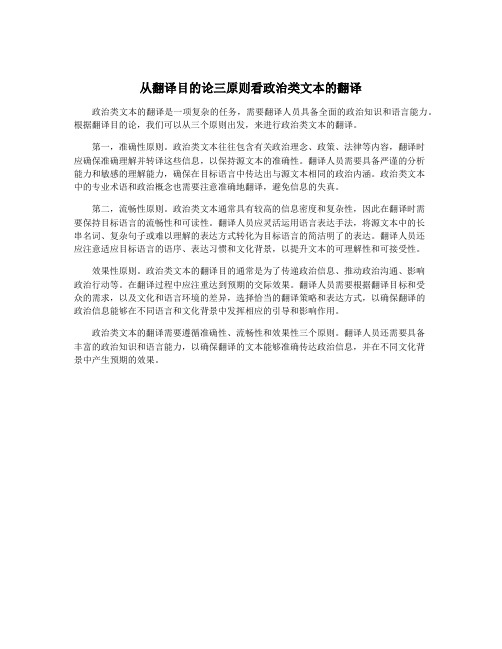
从翻译目的论三原则看政治类文本的翻译
政治类文本的翻译是一项复杂的任务,需要翻译人员具备全面的政治知识和语言能力。
根据翻译目的论,我们可以从三个原则出发,来进行政治类文本的翻译。
第一,准确性原则。
政治类文本往往包含有关政治理念、政策、法律等内容,翻译时
应确保准确理解并转译这些信息,以保持源文本的准确性。
翻译人员需要具备严谨的分析
能力和敏感的理解能力,确保在目标语言中传达出与源文本相同的政治内涵。
政治类文本
中的专业术语和政治概念也需要注意准确地翻译,避免信息的失真。
第二,流畅性原则。
政治类文本通常具有较高的信息密度和复杂性,因此在翻译时需
要保持目标语言的流畅性和可读性。
翻译人员应灵活运用语言表达手法,将源文本中的长
串名词、复杂句子或难以理解的表达方式转化为目标语言的简洁明了的表达。
翻译人员还
应注意适应目标语言的语序、表达习惯和文化背景,以提升文本的可理解性和可接受性。
效果性原则。
政治类文本的翻译目的通常是为了传递政治信息、推动政治沟通、影响
政治行动等。
在翻译过程中应注重达到预期的交际效果。
翻译人员需要根据翻译目标和受
众的需求,以及文化和语言环境的差异,选择恰当的翻译策略和表达方式,以确保翻译的
政治信息能够在不同语言和文化背景中发挥相应的引导和影响作用。
政治类文本的翻译需要遵循准确性、流畅性和效果性三个原则。
翻译人员还需要具备
丰富的政治知识和语言能力,以确保翻译的文本能够准确传达政治信息,并在不同文化背
景中产生预期的效果。
翻译目的论视阈下的中国政治文本翻译文献综述

翻译目的论视阈下的中国政治文本翻译文献综述一、本文概述在全球化的大背景下,政治文本的翻译在国际交流中扮演着至关重要的角色。
它不仅是不同语言和文化之间沟通的桥梁,更是国家形象和国际话语权构建的关键因素。
中国作为一个历史悠久、文化丰富且快速发展的国家,其政治文本的翻译显得尤为重要。
本文旨在通过翻译目的论的视角,对中国政治文本翻译的文献进行综述。
翻译目的论(Skopos Theory)是一种以翻译目的为核心的理论框架,它强调翻译活动应服务于特定的目的和目标受众。
这一理论视角为理解和评估政治文本的翻译提供了新的维度。
本文将首先介绍翻译目的论的基本原理,并探讨其在政治文本翻译中的应用。
本文将回顾和总结近年来在中国政治文本翻译领域的主要研究成果。
这包括对政治文献、官方声明、法律法规等重要文本的翻译策略、实践和挑战的研究。
通过对这些文献的深入分析,本文旨在揭示翻译目的论在中国政治文本翻译中的实际应用,以及它如何影响翻译的质量和效果。
本文还将探讨翻译目的论在促进跨文化交流和理解方面的作用。
特别是在中国特有的政治语境和文化背景下,翻译目的论如何帮助译者在忠实原文的同时,更好地适应目标语言和文化,实现有效的国际沟通。
本文将通过翻译目的论的视角,全面审视中国政治文本翻译的文献,以期为这一领域的进一步研究和实践提供理论支持和参考。
二、翻译目的论概述翻译目的论(Skopos Theory)起源于20世纪70年代的德国,由翻译学者汉斯维尔姆弗里曼(Hans J. Vermeer)和凯瑟琳雷斯(Katharina Reiss)提出。
该理论的核心观点是翻译活动应以实现翻译目的为首要原则,这一原则贯穿翻译实践的始终。
翻译目的论强调,翻译不仅仅是语言文字的转换,更是一种有目的的跨文化交际行为。
翻译的目的、目标受众、文本功能和文化背景等因素,均对翻译过程和结果产生重要影响。
在翻译目的论的框架下,翻译活动被分为三个主要阶段:目的分析、策略选择和译文评估。
“目的论”视域下的政府英文网站翻译探索--以北京政府网英文版为例

例 2:Beijing is an open family.The city pro~
求 达 到预 期 目的[3]。而 翻 译 同样 作 为 一种 行 动 , vides a good working environm ent full of chal~ 需 要行 动者 在 翻译 目的 的 引 导 下 ,综 合 考 虑 一 切 lenge and passion. Everyone puts his shoulder to
一 、 “目的论 ”翻译 理 论 、方 法及 类型
翻译 目的论 主要 是 由凯 瑟琳 在 2O世纪 70年 代首先提出的,但是 当时的“目的论”还未完全成 型 ,主要 强 调 以 功 能 为 目的 。在 翻 译 文 章 的过 程 中 ,已经 不再重 视文 章 的原 本框 架 ,而 是 主要 突 出 文 章翻译 的功 能 。“目 的论 ”在 发 展 的 过 程 中,被 众多学者不断地 丰富和完善 ,其 中克里斯丁 ·诺 得 为 了纠正 功 能 论 中过 重 的 目的 色 彩 ,在 翻译 的 过程 中将“忠诚”原则引入 了翻译 论 当中,这也纠 正 了“目的论 ”当中 的过激 翻 译 目的l_1]。在 翻译 的 过 程 中 ,不能 仅仅将 文 章一 字 不 落地 翻 译 出来 ,这 种 机械 式 的 翻译 方 法 ,不 能 适 应 政 府 进 行 整 治 宣 传的 目的 ,所以应该在政府 网站的翻译过程中,充 分体现翻译在人类主体活动 中的特点 ,应该根 据
梁 君 :“目的论”视域 下的政府 英文 网站翻译探 索— — 以北京政府 网英文版为例 123
本 所要 达 到 的重要 内容 。[2
的影 响 。
在翻译 的过 程 中经常使用 信息 文本 翻译 方 法 、表 情文 本 翻 译 方 法 、文献 性 翻 译 方 法 、逐 字 翻 译方法 、语文学翻译法 、异化翻译等众多的方式。
翻译转换理论视角下政府工作报告英译本研究

翻译转换理论视角下政府工作报告英译本研究Research on the English Translation of Government Work Report from the Perspective of Translation Conversion TheoryTranslation conversion theory is a theory of translation that emphasizes the conversion of the source language into the target language. It is a theory of translation that emphasizes the conversion of the source language into the target language. It is a theory of translation that emphasizes the conversion of the source language into the target language. It is a theory of translation that emphasizes the conversion of the source language into the target language.In the translation of government work report, the translator should pay attention to the conversion of the source language into the target language. The translator should pay attention to the conversion of the source language into the target language. The translator should pay attention to the conversion of the source language into the target language. The translator should pay attention to the conversion of the source language into the target language. The translator should pay attention to the conversion of the source language into the target language.First of all, the translator should pay attention to the conversion of the source language into the target language. The translator should pay attention to the conversion of the source language into the target language. The translator should pay attention to the conversion of the source language into the target language. The translator should pay attention to the conversion of the source language into the target language. The translator should pay attention to the conversion of the source language into the target language.Secondly, the translator should pay attention to the conversion of the source language into the target language. The translator should pay attention to the conversion of the source language into the target language. The translator should pay attention to the conversion of the source language into the target language. The translator should pay attention to the conversion of the source language into the target language. The translator should pay attention to the conversion of the source language into the target language.Finally, the translator should pay attention to the conversion of the source language into thetarget language. The translator should pay attention to the conversion of the source language into the target language. The translator should pay attention to the conversion of the source language into the target language. The translator should pay attention to the conversion of the source language into the target language. The translator should pay attention to the conversion of the source language into the target language.In conclusion, the translation of government work report should be based on the conversion of the source language into the target language. The translator should pay attention to the conversion of the source language into the target language. The translator should pay attention to the conversion of the source language into the target language. The translator should pay attention to the conversion of the source language into the target language. The translator should pay attention to the conversion of the source language into the target language. The translator should pay attention to the conversion of the source language into the target language. The translator should pay attention to the conversion of the source language into the target language. The translator should pay attention to the conversion of the source language into the target language. The translator should pay attention to the conversion of the source language into the target language. The translator should pay attention to the conversion of the source language into the target language. The translator should pay attention to the conversion of the source language into the target language. The translator should pay attention to the conversion of the source language into the target language. The translator should pay attention to the conversion of the source language into the target language. The translator should pay attention to the conversion of the source language into the target language. The translator should pay attention to the conversion of the source language into the target language. The translator should pay attention to the conversion of the source language into the target language.In this way, the translator can ensure the accuracy and fluency of the translation of the government work report. The translation of the government work report should be based on the conversion of the source language into the target language. The translator should pay attention to the conversion of the source language into the target language. The translator should pay attention to the conversion of the source language into the target language. The translator should pay attention to the conversion of the source language into the target language. The translator should pay attention to the conversion of the source language into the target language. The translator should pay attention to the conversion of the source language into the target language. The translator should pay attention to the conversion of the source language into the target language. The translator should pay attention to the conversion of the source language into the target language. The translator should pay attention to the conversion of the source language into the target language. The translator should pay attention to the conversion of the source language into the target language. The translator should pay attention to the conversion of the source language into the target language. The translator should pay attention to the conversion of thesource language into the target language. The translator should pay attention to the conversion of the source language into the target language. The translator should pay attention to the conversion of the source language into the target language. The translator should pay attention to the conversion of the source language into the target language. The translator should pay attention to the conversion of the source language into the target language.In this way, the translator can ensure the accuracy and fluency of the translation of the government work report. The translation of the government work report should be based on the conversion of the source language into the target language. The translator should pay attention to the conversion of the source language into the target language. The translator should pay attention to the conversion of the source language into the target language. The translator should pay attention to the conversion of the source language into the target language. The translator should pay attention to the conversion of the source language into the target language. The translator should pay attention to the conversion of the source language into the target language. The translator should pay attention to the conversion of the source language into the target language. The translator should pay attention to the conversion of the source language into the target language. The translator should pay attention to the conversion of the source language into the target language. The translator should pay attention to the conversion of the source language into the target language. The translator should pay attention to the conversion of the source language into the target language. The translator should pay attention to the conversion of the source language into the target language. The translator should pay attention to the conversion of the source language into the target language. The translator should pay attention to the conversion of the source language into the target language.In this way, the translator can ensure the accuracy and fluency of the translation of the government work report. The translation of the government work report should be based on the conversion of the source language into the target language. The translator should pay attention to the conversion of the source language into the target language. The translator should pay attention to the conversion of the source language into the target language. The translator should pay attention to the conversion of the source language into the target language. The translator should pay attention to the conversion of the source language into the target language. The translator should pay attention to the conversion of the source language into the target language. The translator should pay attention to the conversion of the source language into the target language. The translator should pay attention to the conversion of the source language into the target language. The translator should pay attention to the conversion of the source language into the target language. The translator should pay attention to the。
从翻译目的论三原则看政治类文本的翻译

从翻译目的论三原则看政治类文本的翻译在现代社会中,政治类文本的翻译工作扮演着非常重要的角色。
政治类文本通常包括政策文件、国际条约、外交文书等,它们对于国家之间的交流和合作具有重要的意义。
政治类文本的翻译工作需要遵循一定的原则和规范,以确保原文的信息传达准确无误。
本文将从翻译目的论三原则的角度,探讨政治类文本的翻译原则和技巧。
翻译目的论是翻译理论的一个重要分支,其核心思想是以翻译的目的为出发点,通过研究源语言和目标语言的语言和文化差异,制定合适的翻译策略和原则。
在政治类文本的翻译中,翻译目的论三原则——忠实原文、通顺流畅、传达信息,对于翻译工作者具有指导意义。
忠实原文是指在翻译过程中要尽可能地保持原文的风格、语气和意思。
在政治类文本的翻译中,原文的忠实性显得尤为重要,因为政治文本往往涉及到国家利益、国际关系等重大议题,一字一句都可能影响到双方的合作和交流。
翻译工作者在翻译政治类文本时,应该尊重原文的用词和表达方式,力求做到“信、达、雅”。
通顺流畅是指译文在语言和逻辑上应当通顺,符合目标语言的语法规范和表达习惯。
政治类文本通常具有一定的专业性和严谨性,因此在翻译过程中要尽量避免歧义和模糊之处,保持译文的连贯性和准确性。
翻译工作者还需要考虑到译文的表达方式是否符合目标读者的阅读习惯和理解水平,以确保译文的流畅和易读性。
传达信息是指翻译的最终目的是将原文的信息准确地传达给目标读者。
在政治类文本的翻译中,翻译工作者需要充分理解原文的含义和用意,将这些信息准确地呈现在译文中。
因为政治文本涉及到国家政策、国际条约等重要议题,一旦出现理解偏差或信息失实,就可能对双方之间的合作和交流产生不良影响。
在政治类文本的翻译中,翻译工作者需要在忠实原文和通顺流畅的前提下,确保译文能够准确传达原文的信息。
政治类文本翻译的复杂性和敏感性要求翻译工作者在翻译过程中保持高度的专业性和谨慎性。
在实际工作中,翻译工作者需要根据具体的翻译目的和读者群体,灵活运用翻译目的论三原则,制定合适的翻译策略,确保译文的质量和准确性。
翻译目的论视阈下的中国政治文本翻译文献综述
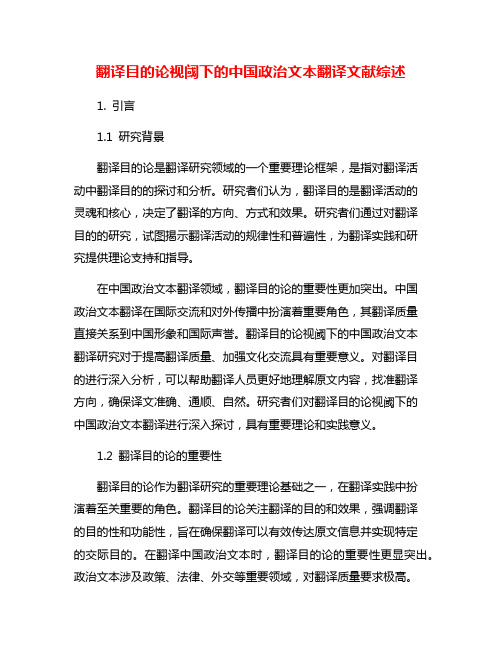
翻译目的论视阈下的中国政治文本翻译文献综述1. 引言1.1 研究背景翻译目的论是翻译研究领域的一个重要理论框架,是指对翻译活动中翻译目的的探讨和分析。
研究者们认为,翻译目的是翻译活动的灵魂和核心,决定了翻译的方向、方式和效果。
研究者们通过对翻译目的的研究,试图揭示翻译活动的规律性和普遍性,为翻译实践和研究提供理论支持和指导。
在中国政治文本翻译领域,翻译目的论的重要性更加突出。
中国政治文本翻译在国际交流和对外传播中扮演着重要角色,其翻译质量直接关系到中国形象和国际声誉。
翻译目的论视阈下的中国政治文本翻译研究对于提高翻译质量、加强文化交流具有重要意义。
对翻译目的进行深入分析,可以帮助翻译人员更好地理解原文内容,找准翻译方向,确保译文准确、通顺、自然。
研究者们对翻译目的论视阈下的中国政治文本翻译进行深入探讨,具有重要理论和实践意义。
1.2 翻译目的论的重要性翻译目的论作为翻译研究的重要理论基础之一,在翻译实践中扮演着至关重要的角色。
翻译目的论关注翻译的目的和效果,强调翻译的目的性和功能性,旨在确保翻译可以有效传达原文信息并实现特定的交际目的。
在翻译中国政治文本时,翻译目的论的重要性更显突出。
政治文本涉及政策、法律、外交等重要领域,对翻译质量要求极高。
通过运用翻译目的论,翻译者可以更好地把握政治文本的语言特点和表达目的,确保翻译版本准确、清晰、恰当地传达原文意义,避免信息失真和歧义。
深入理解和应用翻译目的论对于提升中国政治文本翻译质量具有重要意义。
在今后的研究和实践中,进一步探讨翻译目的论在中国政治文本翻译中的具体应用,将有助于推动政治翻译领域的发展与进步。
2. 正文2.1 翻译目的论视角下的中国政治文本翻译特点1. 文化差异影响:中国政治文本涉及到政治体制、法律制度等特定领域,而中西文化差异较大,翻译时需要考虑这些文化差异对译文的影响,避免产生歧义。
2. 政治术语翻译难度大:政治术语具有专业性和严谨性,翻译时需要准确表达政治概念,避免歧义和误解。
从目的论之角度看外宣政治文献的英译
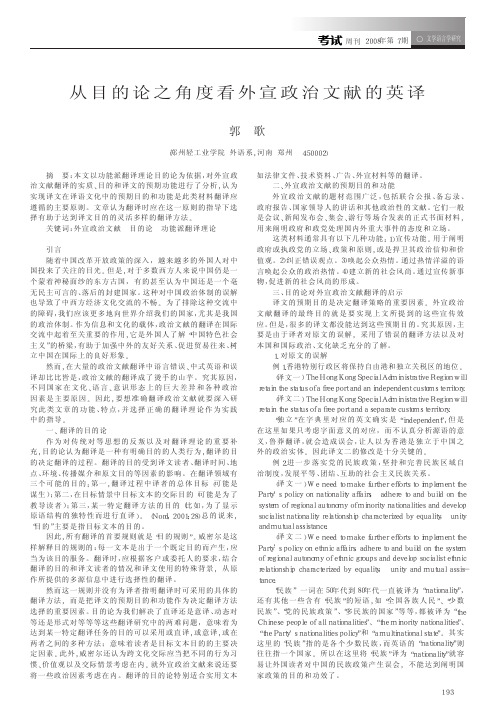
从目的论之角度看外宣政治文献的英译
郭歌
( 郑州轻工业学院 外语系, 河南 郑州 450002)
摘 要: 本文以功能派翻译理论目的论为依据, 对外宣政 治文献翻译的实质、目的和译文的预期功能进行了分析, 认为 实现译文在译语文化中的预期目的和功能是此类材料翻译应 遵循的主要原则。文章认为翻译时应在这一原则的指导下选 择有助于达到译文目的的灵活多样的翻译方法。
王宪生1997还有不少中文特有的带有数字的简称在翻译时为了照顾译文读者的文化习惯达到译文预期目的在翻译方法上也应该做这样的调三讲教育译文一threeemphaseseducation译文二tostresstheoreticalstudypoliticalawarenessgoodconduct译文一thethreeprocessingonecompeationtrade译文二processingsuppliedmaterialsprocessingaccordingclientsuppliedsamplesassemblingimportedcomponentscompeationtradeforeigntradebusiness菜篮子工程译文一vegetablebasketproject译文二aprojectestablishingproductionbasesincreasingnonstaplefoodsupply这些在中国人生活中司空见惯的名词简称对于生活在完全不同的社会环境中的外国人来说如同天书翻译时绝不能像译文一样简单地照字面直译而应该将这些简称所指的完整内容解释清楚这样才能起到服务读者传达信息宣传中国 料 、广 告 、外 宣 材 料 等 的 翻 译 。 二 、外 宣 政 治 文 献 的 预 期 目 的 和 功 能 外 宣 政 治 文 献 的 题 材 范 围 广 泛 , 包 括 联 合 公 报 、备 忘 录 、
目的论视角下《政府工作报告》的英译分析

- 231 -校园英语 / 翻译探究目的论视角下《政府工作报告》的英译分析西安外国语大学/张稳【摘要】政治外宣英译的优劣直接影响到西方人对中国政策方针的认识和中西方的互动交流,其利害关系,不言自明。
故本文以2014年《政府工作报告》为例,从目的论出发对其中典型的翻译现象进行解释,尝试挖掘目的论指导外宣翻译的潜力。
【关键词】目的论 目的原则 外宣翻译一、引言政治外宣文本有很强的目的性和政治严肃性以及典型中国特色语言,英译过程必然障碍重重。
然而为了取得良好的传播效果,在翻译的过程中译者需多站在目标读者的角度尽可能表达足够的信息。
二、目的论由维米尔提出的目的论重点解释了目的、连贯和忠实原则。
其中目的原则处统摄地位以确保译文在目的语文化和语言中传达的信息要与原文在原文化和语言中传达的信息相关,但两者并非一定要在功能上等同。
这凸显出目的论优势在于允许译文因翻译目的和翻译委托而异。
连贯原则是指译文必须内部连贯,必须具有可读性和可接受性且迎合译文接受者的知识水平。
忠实原则强调原文的信息、译者对的阐释以及译者表达的信息之间必须忠实。
三、目的论视角下《政府工作报告》的英译研究1.目的原则。
从目的原则视角分析比照例文,不难发现译者使用了多种翻译方法以准确无误地将原文信息传递给目标读者。
(1)增词译法。
增词译法是为了使译文尽可能与原文信息,效果,功能对等而在译文中增添的非加不可的词语。
1)“三公” official overseas visits, official vehicles and official hospitality“四风”f o r m a l i s m , b u r e a u c r a c y, h e d o n i s m a n d extravagance例1)中的缩略词 “三公”“四风”代表了具中国特色的典型政治用语,若直接音译,西方读者必然会感到云里雾里。
为使目的读者准确理解原文信息,译文中需要增加必要的解释性信息,且因此类特殊词汇在英文中并没有确切对应词汇,只需提供阐释性翻译即可,该词本身不一定要译出。
译者主体性在外宣翻译中的体现——以《2014年政府工作报告》英译为例
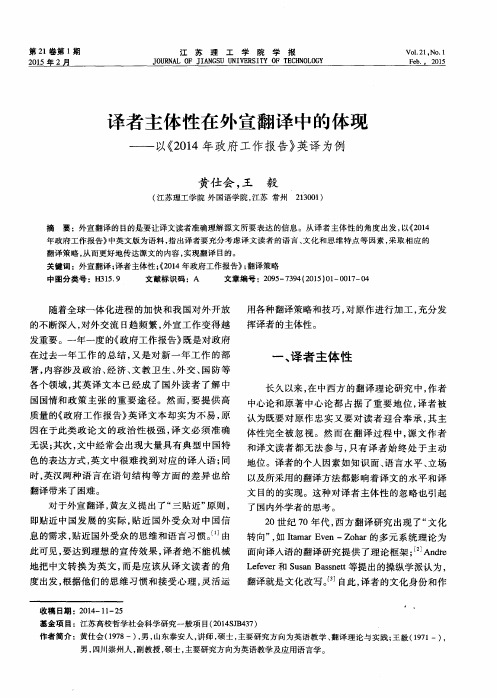
中心论和原著 中心论都 占据 了重要 地位 , 译者被 质量 的 《 政府工作报告》 英 译 文本 却 实 为 不 易 , 原 认 为既要 对 原作 忠 实 又 要 对 读 者 迎 合 奉 承 , 其 主 因在 于此 类 政 论 文 的 政 治 性 极 强 , 译 文 必 须 准 确 体性 完全 被 忽 视 。然 而 在 翻 译 过 程 中 , 源 文 作 者
注意 汉英 两种语 言 的差 异 , 考 虑 译 文 读 者 的反 应 ,
指的是译者在翻译中体现的一种 自觉的人格意识及 从译文的可理解性和可接受性 出发, 采用替代 或
其 在翻译 中的一 种创 造意 识 。 ” _ 4 而 在 同一 时期 , 查 省译 等方 法加 以翻译 。 明建 、 田雨也认 为 : “ 译者 主体 性是 指 作为 翻译 主体 的译 者在尊重 翻译 对象 的前 提下 , 为 实现 翻译 目的 而在翻译活动 中表 现出 的主观 能动性 。 ” _ 5
无误 ; 其次 , 文 中经 常会 出现 大 量 具有 典 型 中 国特 和译文读者都无 法参与 , 只有译 者始终处 于主 动 色 的表达 方式 , 英 文 中很 难 找 到对 应 的译 人 语 ; 同 地位 。译者的个人因素如知识面、 语言水平 、 立场 时, 英 汉 两种 语 言 在 语 句 结 构 等 方 面 的差 异 也 给
年政 府工作报告》 中英文版为语料 , 指出译者要充分考虑译 文读者 的语言 、 文化和思 维特点等 因素 , 采取相应 的
翻译 策略 , 从而更好 地传达源文 的内容 , 实现翻译 目的。
关键词 :外宣翻译 ; 译者主体性 ; ( 2 0 1 4年政府工作报告》 ; 翻译策 略
中 图 分 类 号 :H 3 1 5 . 9 文 献标 识 码 :A 文 章 编 号 :2 0 9 5 - 7 3 9 4 ( 2 0 1 5 ) 0 1 - 0 0 1 7 —0 4
目的论视角下《政府工作报告》中译英研究

目的论视角下《政府工作报告》中译英研究目的论视角下《政府工作报告》中译英研究在当今全球化背景下,政府工作报告是各国政府向国际社会展示国家实力并传达政策主张的重要文献之一。
在中国,政府工作报告作为国家最高权力机关的发声之一,对于展示中国国内外形象、推进国家发展、引导社会舆论具有重要意义。
然而,政府工作报告的中译英过程却面临许多挑战,因为不同语言文化背景、翻译目的以及读者需求等多重因素都会对翻译策略和效果产生影响。
本文将从目的论视角出发,探讨《政府工作报告》中译英的研究。
一、目的论概述目的论是指翻译的出发点和归宿,即翻译的目的决定了翻译的策略和效果。
翻译的核心任务是为读者提供有效的信息传达,因此在政府工作报告的翻译过程中,译者需要根据不同的读者需求和背景选择合适的翻译策略和手段。
二、目的与读者需求在政府工作报告的翻译过程中,读者需求是一个重要的考量因素。
作为政府工作报告的读者,可以分为国内外两类。
国内读者更关注国内政策和具体实施情况,而国外读者则更关注中国的发展方向、政策调整和对外合作等。
因此,译者在进行政府工作报告的翻译时需要根据不同读者的需求调整翻译策略。
例如,在面向国内读者时,译者可以更加注重对政策条目的准确翻译和细节展示;而对于国外读者,译者则需要更加注重中国发展的整体框架和宏观趋势的表达。
三、目的与翻译策略根据目的论的观点,翻译策略和手段应当根据不同的翻译目的来选择。
在政府工作报告的翻译中,译者可以采用准确翻译、调整翻译、意译等多种策略。
准确翻译是指尽可能保持原文的信息和风格,对于政策具体细节的翻译可以采用准确翻译。
调整翻译是指根据目的文化和读者需求对原文进行适度的调整,以便更好地满足读者的理解和接受。
意译是指在保留原文基本信息的前提下,通过对文化背景和修辞手法的理解,进行更加自由的翻译。
在政府工作报告的翻译中,准确翻译和调整翻译的运用相对更为常见,因为政策内容的实际性和权威性要求较高。
四、目的与语言风格政府工作报告是一种特殊的官方文献,其语言风格通常较为庄重、正式、官方。
试析《政府工作报告》中高频词汇的翻译——以2014年《政府工作报
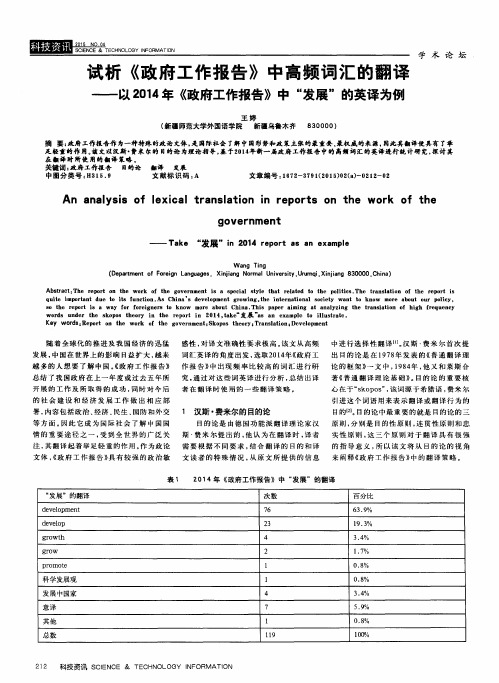
w o r d s u n d e r t h e s k o p o s t h e o r y i n t h e r e p o r t i n 2 0 1 4 , t a k e “ 发展 ” a s a n e x a m p l e t o i l l u s t r a t e .
q ui t e i mp or t a n t d u e t o i t s f u n c t i o n. As C hi na ’ S d e v e l o p me n t g r o wi n g, t h e i n t e r n a t i o n a l s o c i e t y w a n t t o k n o w mo r e a b o u t o u r p o l i c y,
目的 论 是 由 德 国 功 能 派 翻 译 理 论 家 汉
心 在于 “ s k o p o s ” , 该词 源 干 希 腊语 , 费米 尔 引进 这 个 词语 用 来表 示 翻 译 或 翻 译 行 为 的 目的【 2 】 。 目的 论 中 最重 要 的 就 是 目的论 的 三
学 术 论 坛
Байду номын сангаас
试析 政府工作报告 中高频词汇的翻译
以2 0 1 4 年 政府工作报告 中 “ 发展 "的英译为例
王 婷 ( 新疆 师范大学外 国语学 院 新 疆 乌鲁 木齐
8 3 0 0 0 0 )
摘 要: 政 府工作报 告作 为一种特殊 的政论 文体 , 是 国际社会 了解 中国形势和政策主 张的最重要 , 最权威 的来源 , 因此其翻译 便具有 了举 足 轻重 的作 用。 该 文以汉斯 ・ 费米 尔的 目的论 为理论 指导 , 基于2 0 1 4 年 新一 届政 府 工作报告 中的 高频词汇 的英译进 行统 计研 究, 探讨 其
从翻译目的论三原则看政治类文本的翻译
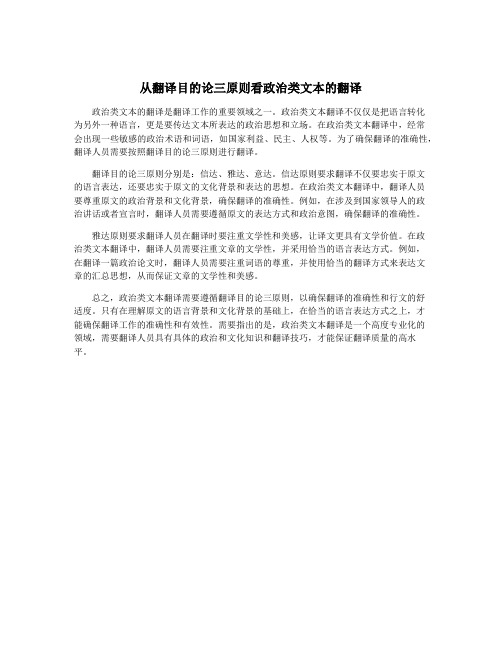
从翻译目的论三原则看政治类文本的翻译
政治类文本的翻译是翻译工作的重要领域之一。
政治类文本翻译不仅仅是把语言转化
为另外一种语言,更是要传达文本所表达的政治思想和立场。
在政治类文本翻译中,经常
会出现一些敏感的政治术语和词语,如国家利益、民主、人权等。
为了确保翻译的准确性,翻译人员需要按照翻译目的论三原则进行翻译。
翻译目的论三原则分别是:信达、雅达、意达。
信达原则要求翻译不仅要忠实于原文
的语言表达,还要忠实于原文的文化背景和表达的思想。
在政治类文本翻译中,翻译人员
要尊重原文的政治背景和文化背景,确保翻译的准确性。
例如,在涉及到国家领导人的政
治讲话或者宣言时,翻译人员需要遵循原文的表达方式和政治意图,确保翻译的准确性。
雅达原则要求翻译人员在翻译时要注重文学性和美感,让译文更具有文学价值。
在政
治类文本翻译中,翻译人员需要注重文章的文学性,并采用恰当的语言表达方式。
例如,
在翻译一篇政治论文时,翻译人员需要注重词语的尊重,并使用恰当的翻译方式来表达文
章的汇总思想,从而保证文章的文学性和美感。
总之,政治类文本翻译需要遵循翻译目的论三原则,以确保翻译的准确性和行文的舒
适度。
只有在理解原文的语言背景和文化背景的基础上,在恰当的语言表达方式之上,才
能确保翻译工作的准确性和有效性。
需要指出的是,政治类文本翻译是一个高度专业化的
领域,需要翻译人员具有具体的政治和文化知识和翻译技巧,才能保证翻译质量的高水
平。
目的论下的外宣翻译策略--以政府工作报告为例

目的论下的外宣翻译策略--以政府工作报告为例翟云超;王显志【摘要】外宣翻译是中外沟通交流的重要通道。
由于对外宣传的政治色彩以及中西方文化上的巨大差异,因此外宣材料的翻译过程中需要采取不同于传统翻译的策略。
以功能派理论目的论为依据,并结合2014年政府工作报告中英文翻译,探讨了外宣翻译的策略与方法,为达到更好的输出效果提供解决方案。
%Publicity translation plays an important role in the communication between China and the world . Nevertheless ,publicity translation strategies are distinguished from traditional translations on account of the cultural diversity as well as the political reasons .Viewing from the skopos of functionalist approaches to translation and based on the 2014 report on government work ,this essay proposes some C-E publicity translation strategies in order to deliver better methods of translating .【期刊名称】《河北联合大学学报(社会科学版)》【年(卷),期】2015(000)001【总页数】4页(P97-99,103)【关键词】外宣翻译;目的论;政府工作报告【作者】翟云超;王显志【作者单位】河北联合大学,外国语学院,河北唐山 063000;河北联合大学,外国语学院,河北唐山 063000【正文语种】中文【中图分类】H3159随着经济的发展,中国在世界上的话语权愈发重要。
目的论视角下《政府工作报告》的英译分析
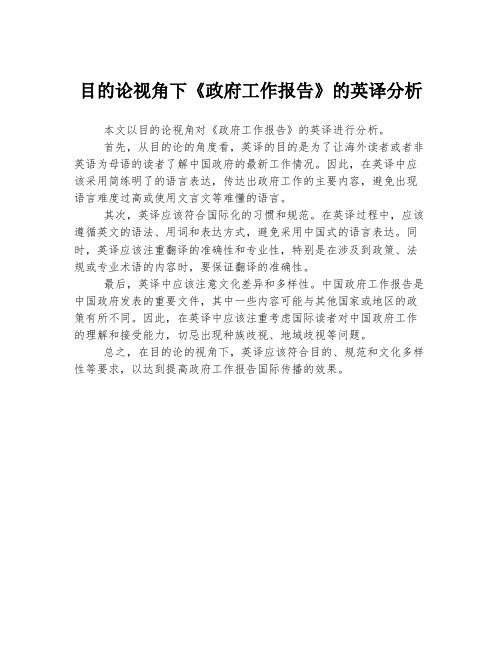
目的论视角下《政府工作报告》的英译分析
本文以目的论视角对《政府工作报告》的英译进行分析。
首先,从目的论的角度看,英译的目的是为了让海外读者或者非英语为母语的读者了解中国政府的最新工作情况。
因此,在英译中应该采用简练明了的语言表达,传达出政府工作的主要内容,避免出现语言难度过高或使用文言文等难懂的语言。
其次,英译应该符合国际化的习惯和规范。
在英译过程中,应该遵循英文的语法、用词和表达方式,避免采用中国式的语言表达。
同时,英译应该注重翻译的准确性和专业性,特别是在涉及到政策、法规或专业术语的内容时,要保证翻译的准确性。
最后,英译中应该注意文化差异和多样性。
中国政府工作报告是中国政府发表的重要文件,其中一些内容可能与其他国家或地区的政策有所不同。
因此,在英译中应该注重考虑国际读者对中国政府工作的理解和接受能力,切忌出现种族歧视、地域歧视等问题。
总之,在目的论的视角下,英译应该符合目的、规范和文化多样性等要求,以达到提高政府工作报告国际传播的效果。
翻译目的论视阈下的中国政治文本翻译文献综述

翻译目的论视阈下的中国政治文本翻译文献综述目前,翻译领域已经变得日益重要,并且在全球范围内被广泛应用。
翻译的范围涉及到各种不同类型的文本,包括政治文本。
中国的政治文本对于理解和分析中国的政治环境非常重要。
本文将综述一些关于中国政治文本翻译的研究文献。
翻译目的是进行任何翻译活动的核心。
在翻译中国政治文本时,翻译目的应该是确保译文准确地传达原始文本的意思。
因为政治文本通常具有明确的政治意图和目的,因此在翻译过程中需要谨慎处理。
Yu的研究(2014)探讨了政治性文本的翻译目的,并提出了一个综合考虑翻译目的的模型。
这个模型包括从译者和原始文本的视角来分析翻译目的,并提供了一个框架来决定如何传达原始文本的意义。
中国政治文本的翻译也受到视阈的影响。
视阈是指翻译者在翻译过程中所持有的态度、观点和立场。
政治文本翻译中的视阈问题主要涉及到政治文本如何被翻译成另一种语言并传达给另外一个文化背景的读者。
Li和Ai的研究(2016)讨论了政治文本翻译中的视阈问题,并指出翻译者的视阈对于译文的准确传达至关重要。
他们认为,翻译者应该尽量保持客观和中立的立场,以确保译文不会出现政治偏见或误导。
中国政治文本的翻译还面临一些具体的挑战。
中国政治文本通常使用复杂的政治术语和专业词汇,这对翻译者的专业知识和背景要求很高。
Wang和Wu的研究(2019)分析了中国《反腐败法》的翻译挑战,并提出了几种应对策略,如使用注释和解释来帮助读者理解政治术语的含义。
中国政治文本的翻译也需要考虑文化背景的因素。
政治文本往往涉及到特定的政治和法律制度,这对于非中国母语的读者来说可能很难理解。
翻译者需要考虑如何将中国政治文本的文化因素适应到目标语言和文化环境中。
Wu和Wang的研究(2017)探讨了中国《反腐败法》的翻译中文化因素的影响,并提出了一些应对策略,如对中国文化特点进行解释和说明。
翻译中国政治文本需要考虑到译文的目的、视阈、专业知识、文化背景等因素。
从目的论角度看中英政治术语翻译【英语论文】

从目的论角度看中英政治术语翻译【英语论文】唐山学院学年论文论文题目从目的论角度看中英政治术语翻译系别外语系班级 09英本1班姓名孙力指导教师冯占峰2012年7The Skopostheorie on the C-E translation of Political terms Student Sun LiSupervisor Feng ZhanfengDepartment of Foreign LanguagesTangshan CollegeJuly 2012中文摘要政治术语的翻译是一种带有鲜明语言特色和政治倾向的应用文体具有诸多的研究价值并且政治术语的翻译在国家的政治交流中起着举足轻重的作用本论文以目的论为切入点来探讨政治术语的翻译目的论突破了传统翻译对等理论的限制为翻译研究开辟了新的视角按照目的论翻译是一种目的性的复杂行为目的论强调的不是源语文本而是目的语文本译者的地位和译入语的读者译入语的目的决定翻译方法的选择本文详尽阐述了系列德国翻译大师的理论全文从译者主体性的视角来探讨政治术语的翻译应用本文由三个部分组成第一部分介绍了政治术语翻译的重要性由于政治翻译的误译导致的政治纠纷屡见不鲜为此误导政坛的见解丧失其应有的政治效应第二部分详细的介绍了目的论的发展过程和基础理论第三部分介绍了政治翻译的时新性和政治倾向性因此政治翻译必须注重信息的时效性和准确性以及政治立场译词要准确语言通顺文体贴切并且在此部分还分析了误译产生的原因如语言文化和政治立场的巨大差异总之本文总结了目的论在政治术语翻译中的有效应用该理论的主要缺陷在于过多的强调译者的主体性不够尊重源语文本并为进一步的研究提出了建议关键词政治术语目的论译者主体性AbstractPolitical terms which make great contribution to the political communication between China and western countries are a non-literary style with distinctive linguistic forms and featuresThis thesis discusses political termstranslation on the basis of skopostheorieAs a breakthrough with the traditional equivalence-oriented approaches Skopostheorie has offered a new perspective to translation studies According to Skopotheorie translation is a complex action designed to achieve a certain purpose which does not focus on the source text but rather on the target text the status of the translator and the target reader the translating method chosen by the translator is determined by the perpose of the target textThe author expounds the theories put forward by German translationmastersFrom the perspective of translatorssubjectivitythe thesis discusses how to apply the theories on the translation of the political termsThe thesis consists of three parts Part one is the introduction to the significance ofpolitical terms Part two the text discuss the original and development of the theories Part three it introduces the timely and political trend on the translation of political termsDue to the errors and the political trend on the translation of the political terms a practical guidance is badly needed therefore the translation is supposed to transmit information timely choose words correctly use smooth and popular languages and adopt appropriate stylesAs a whole the text sums up the practical application of Skopostheorie on the translation of the political terms criticizes that Skopostheorie does not pay sufficient attention to the source text and puts more emphasis on translators subjectivity The author puts forward suggestions for further studyKey words political terms Skopostheorie translators subjectivityContentPartⅠ Introduction11Brief introduction to the translation12Government reports explained13General priciples for governmet reports translting PartⅡA Literature Review of Skopostheorie21The original of Skopostheorie and its development 22Basic rules of SkopostheoriePartⅢApplication of Skopostheorie to the government reports translating31Government reports translating from the skopos view 32The role of translator in the government reports translation33Special issues of translator in the government reports translatingNotesBiographyAcknowledgementsPartⅠ Introduction11 The Theoretical Guide on English Translation of Chinese Political TermsOn the basis of normal Englishthe translation of Chinese political terms integrates traditional culture and thinkingpatterns of Chinese peopleThey express the typical political events and phenomena in Chinese society and reflect the development of Chinese political systemThe political terms play a very important role in the international communication and cooperationHoweverthe present translation techniques of political terms are mainly focused on literal translationfree translation and literal translation plus an explanationtransliteration can hardly be foundIn factit is the transliteration words that make the Chinese political terms have Chinese characteristicsThereforepeople should more frequently take transliteration in the translation of Chinese political terms to display Chinese characteristics The study of this thesis is both quantitative and qualitative the political terms are quite different from other styles of English and it needs particular translation criteria methods and priciple and also requires that the translator should have the right political trend In order to transmit the information translator should be confined by the original text which makes the translation of policies and political terms more difficult Beacause of the linguistic and cultural barriers between Chinese and Englishthe political trend differences communications some problems always found on the translationof political terms12 Framework of the ThesisThe thesis consists of three parts Part one is the introduction to the significance of political terms Part two the text discuss the original and development of the theoriesPart three it introduces the timely and political trend on the translation of political termsDue to the errors and the political trend on the translation of the political terms a practical guidance is badly needed therefore the translation is supposed to transmit information timely choose words correctly use smooth and popular languages and adopt appropriate stylesPart Ⅱ A Literature Review of Skopostheorie21 The origin of Skopotheorie and Its developmentThe Skopos theory is an approach to translation which was put forward by[ Hans Vemeer] and developed in Germany in the late 1970s and which oriented a more functionally and socioculturally concept of translation Translation is considered not as a process of translation but as a specific form of human action In our mind translation has a purpose and the word Skopos was from Greek Its used as the technical termfor the purpose of the translation In the frame work of this theory one of the most important factors determining the purpose of a translation is the address who is the intended receiver or audience of the target text with their world language Every translation is directed at an intended audience The theory focuses above all on the purpose of the translation which determines the translation methods and strategies that are to be employed in order to produce a functionally adequate result Vermeer regards it as an offer of information that is partly or wholly turned into an offer of information for the target audience From this view the status of the source is clearly much lower in Skopos theory than the equivalence theory Skopos theory is the nucleus of German Functional School The main idea of Skopos theory is that translators should hold the thought from the perspective of the target readers during the process of translation Therefore translators should bear in mind what the function of translation text is what the target readers demand is and even what communicative situation is Consequently the choice of translation strategies is decided by the purpose of the translation textin order to achieve a better function textThere are three main rules which are skopos rule coherencerule and fidelity rule1 Skopos RuleSkopos is a Greek word for"aim"or"purpose" "The top-ranking rule for any translation is thus theskopos rule which means that a translation action is determined by its skopos that isthe end justifies the means"by Reiss and Vermeer Vermeer also stresses on many occasions that the skopos rule is a general rule and translation strategies and methods are determined by the purpose and the intended function of the target text2Coherence RuleThe coherence rule states that the target text "must be interpretable as coherent with the target text receivers situation"In other wordsthe target text must be translated in such a way that it is coherent for the target text receiversgiven their circumstances and knowledge In terms of coherence rulethe source text is no longer of most authority but only part of the translation beliefeIt is only an offer of information for the translatorwho in turn picks out what he considers to be meaningful in the receivers situationSkopos theory takes seriously factors which have alwaysbeen stressed in action theory and which were brought into sharp relief with the growing need in the latter half of the twentieth century for the translation of non-literary text types In the translation of scientific and academic papers instructions for use tourist guides contracts etc the contextual factors surrounding the translation cannot be ignored These factors include the culture of the intended readers of the target text and of the client who has commissioned it and in particular the function which the text is to perform in that culture for those readers Skopos theory is directly oriented towards this function22Basic Concept of the SkopotheorieSkopos theory is an approach to translation which was developed in Germany in the late 1970s Vermeer 1978 and which reflects a general shift from predominantly LINGUISTIC and rather formal translation theories to a more functionally and socioculturally oriented concept of translation cf ACTION THEORY OF TRANSLATORIAL ACTION COMMUNICATIVEFUNCTIONAL APPROACHES This shift drew inspiration from communication theory action theory text linguistics and text theory as well as from movements in literary studies towards reception theories see for example Iser 1978 Apart from Hans Vermeerthe founder of skopos theory other scholars working in the paradigm include Margret Ammann 19891990 Hans Hnig and Paul Kussmaul 1982 Sigrid Kupsch-Losereit 1986 Christiane Nord 1988 and Heidrun Witte 1987a see also articles in the journal TEXTconTEXT published since 1986 by Groos in Heidelberg Skopos theory takes seriously factors which have always been stressed in action theory and which were brought into sharp relief with the growing need in the latter half of the twentieth century for the translation of non-literary text types In the translation of scientific and academic papers instructions for use tourist guides contracts etc the contextual factors surrounding the translation cannot be ignored These factors include the culture of the intended readers of the target text and of the client who has commissioned it and in particular the function which the text is to perform in that culture for those readers Skopos theory is directly oriented towards this functionTranslation is viewed not as a process of transcoding but as a specific form of human action Like any other human action translation has a purpose and the word skopos derived from Greek is used as the technical term for the purpose of a translation Skopos must be defined before translation can begin inhighlighting skopos the theory adopts a prospective attitude to translation as opposed to the retrospective attitude adopted in theories which focus on prescriptions derived from the source textSkopos theory has helped to bring the target text into focus As a text a translation is not primarily determined by a source text but by its own skopos This axiom provides a theoretical argument for describing translations in terms of original text production and against describing those in the more traditional terms of EQUIVALENCE with another text in another language see also Jakobsen 1993156 Translation is a DECISION MAKING process The criteria for the decisions are provided by the skopos ie the concrete purpose and aims in a concrete translation commissionPartⅢ A Brief Survey of Political terms31 Characters of Chinese political termsWestern studies of China have traditionally focused on Chinese culture whence the term Sinologyimplying that the study of China constituted a science or discipline in its own right This approach became incorporated into the self-conscious movement toward a scientific method in political science cresting in the generation following WorldWar II in the concept of political culture Sinology assumes that China is sufficiently different from the west that it cannot be understood in terms assumed in the west The concept of political culture is more universalistic the product of an ambition to extend the scientific study of politics to the new political systems taking shape in the wake of decolonization Political culture was especially a feature of modernization theoryThere are beyond these disciplinary rationales particular reasons for making political culture a central theme in the study of Chinese politics the role and place of Chinese culture has itself been a central theme in Chinese politics proper for more than a century and a half Along of course with many other themes Chinese political discourse has argued over whether the traditional culture however defined or conceived should be preserved or overthrown whether this culture is an obstacle to Chinas wealth and power or a distinctive way to it whether it retains any relevance in the world today whether it can provide moral cohesion to a society battered by internal turmoil and foreign aggression Whether because China actually is distinct or because those who study it continue to find it so the study of Chinese politics has not been well-integrated into generalpolitical science In the general discipline political culture has lost much of its former cachet and while it may be less important in Chinese political studies than it once was there remains a sense that Chinese politics cannot properly be understood without some nod to the countrys cultural distinctivenessPolitical culture should be particularly relevant in Chinese studies since the role of Chinese culture has been a major political issue for close to 150 years There is also a tendency to couch this issue in terms of tradition and modernity however problematic the distinction may be analytically The concern with culture arises from the Chinese political process itself and is not a paradigm imposed upon it orientalist fashion from the outsideThe official vision accepted by both Nationalists and communists takes the Opium war as marking a major turning point in Chinese history marking the forcible incorporation of China into the world system China had been weak at various times in its history and under non-Chinese rule but previous conquerors had ruled China only on Chinese terms accepting the imperial system and the Confucian culture The western barbarians did not conquer the country but only bent it to their will and they didnot accept the superiority of Chinese cultureWith the development of China some Chinese characters translations have occurredSuch as CPPCC Chinese Peoples Political Consultative Conference 中国人民政治协商会议 Communist Party of China 中国共产党 National Peoples Congress NPC 全国人民代表大会The Two Meetings CPPCC NPC 两会 reform and opening up policy 改革开放政策social programs社会事业 moderately prosperous society小康社会macroeconomic regulatory宏观调控 new socialist countryside 社会主义新农村rural migrant workers in cities农民工state-owned enterprises国有企业 compulsory education义务教育incorporated villages行政村combat corruption反腐socialist market economy社会主义市场经济ensure that all of the people share in the fruits of reform and development让全体人民共享改革发展的成果Those political terms are all included Chinese characters3 The Existing problems on the English Translation of Political termsChinese political terms are difficult to understand and translate because those terms are all alluding to special political meaningsThe cultures of the East and the West really distinguish each other a lot This is because the culture systemsare two separate systems on the whole The origin of the eastern cultures is mainly from two countries China and India Both of the two cultures are gestated by rivers In China the mother river is the Yellow River while the Indian one is the Hindu River These two cultures were developed for several thousand years and formed their own styles Then in Dang Dynasty of China the Chinese culture gradually went overseas to Japan mixed into the Japanese society and shaped the Japanese culture nowadays One countrys political trend inflected the translation of political terms The priciple of the translation must base on the countrys policies33 The adoption of Skopostheorie on the translation of political termsAccording to Skopotheorie translation is more a decision-making process than a produce In the process the efforts made by the translator should be highly valued and the translators subjectivity is put on an unprecedented high position According to Skopos rule the status of Sltext is much lowered the Sltext is only an offer of informetion It is purpose that determines what to be translated how much to be translated and what strategied to take in the specific practice In line with the coherence rule the translated text should make sensein target readers communicative situation and culture and the reader should be able to understand it the translator should be loyal to the source language as well as the target language In the light of Skopostheorie every translator bears a given purpose in the mind before he starts to translate and one of the most important factors determining the purpose of a translation is the addressee who is the intended receivers of their expectations and their communicative needs And the political terms translation reflected the use of the Skopostheorie The translation of the Chinese political terms has some purpose sevived for the policies34Government report translation from the skopos point of viewConclusionPolitical terms reflected the policies of one country It provides a large quantity of information ranging from serious international affairs to a prominent persons private life With the rapid development of Chinas economy and society we badly need communication with countries all over the world Due to linguitic differences cultural barriers and the unique policies the priciples of the translation must base on the policies reflecting one countrys policies But sometimes thetheories from Skopos always have some bad inflection because every countrys translator will take the translation from their own priciples and political trendThe text summarys the application of the Skopostheorie on the translation of political terms And no doubt further studies have been excpted highlyNotes1 Katharina Ress born in 1923 German linguist and translation scholara defender of the skopos theory2 Hans-Josef Vermeer September 24 1930 - Heidelberg February 4 2010 German linguist and translation scholar3 Margret Ammann 1989 German linguist and translation scholar4 Hans Hnig and Paul Kussmaul 1982 German linguist and translation scholar5 Peter Newmark b A textbook of Translation Shanghai Shanghai Foreign language press 1993BibliographyPeter Newmark a Approches to Translation Shanghai Shanghai Foreign language press1993Peter Newmark b A textbook of Translation Shanghai Shanghai Foreign language press1993Eugene A NidaLanguage Culture and TranslationShanghai Shanghai Language PressKatharina ReissTranslation Criticism Potential and LimitationShanghai Shanghai Language Education Press Hans J Vermeer Linguistische und translatologische Publikationen und übersetzungen 1963- 1992 Registerband Stand com贾文波应用翻译功能论北京中国对外翻译出版公司2005金惠康跨文化交际翻译续篇北京中国对外出版公司2005张锦兰目的论与翻译方法中国科技翻译 Vol5 No3 200123-27陈明瑶浅论政治性的com22 No5 200133-35Venneer Hans J Skopos and commission in translational action [M] 世界图书出版公司 19895。
- 1、下载文档前请自行甄别文档内容的完整性,平台不提供额外的编辑、内容补充、找答案等附加服务。
- 2、"仅部分预览"的文档,不可在线预览部分如存在完整性等问题,可反馈申请退款(可完整预览的文档不适用该条件!)。
- 3、如文档侵犯您的权益,请联系客服反馈,我们会尽快为您处理(人工客服工作时间:9:00-18:30)。
例 2 :成功应对光伏 “ 双反”等重大贸 易摩擦 。 译 文 : Ma j o r t r a d e d i s p u t e s o v e r
a n t i -d u mp i n g a n d c o u n t e r v a i l i n g d u t i e s o n C h i n e s e p r o d u c t s ,s u c h a s p h o t o v o l t a i e s o l a r p r o d u c t s , we r e s u c c e s s f u l l y r e s o l v e d .
例1 中的简政放权是最近政治领域经常 提到 的热 词 ,如 果仅仅 只是单 纯的翻译 成
“
s i mp l y t h e a d mi ni s t r a t i o n a n d a b nd a o n t h e
理论 背景 首先 。 目的论 中最 中心的原则 其实就是 目的原则 , 也 就是翻译 行为是由其 目的决定 , 我们也可 以说 “ 目的决定手段” 。所 以 , 我 们一 般可 以认 为翻译 成果应该 能使你 的译 本满足其功能。而在 目的原则方面 , 解决直 译或意译 、 动态对等还是形式对等一直是 翻 译 的中心议题 。如何处理这些关 系由文本 的 目的决定但是也决定 了翻译的质量。 其次 , 连贯原则也是 目的论 的一个重要 原则 。 连贯原则 意味着译文一定要跟读 者的 所在环境存在着一定的连贯性 。不仅存 在于 内部连贯, 还必须与原文本有连贯关 系。
随着中国经济的快速发展 和进步 , 世界 形势也愈加复杂 ,中国越来越成 为其 中举足 轻重甚至是不可或缺的角色。中国在国际上 的影响力 日 益增强 。 并随着对外交流 的深入 发展和宣传力度 的不断扩大 , 中国受 到世界 越来越多的关注 。3 月 5日,李克强代表 国 务 院在十二届全 国人大二次会议上作 《 政府 工作报告 》 。 内容包括 2 0 1 3 年工作 回顾 , 2 0 1 4 年总体工作部署 以及 2 0 1 4年重点工作 。其 中内容包括政治 ,经济、文化 ,社会、生态 文 明建设等等各个领域 , 政府 工作报告对我 国最近时期 的政治走 向政治策 略有着 决定 性和指导性作用 。因此政府工作报告 的英译 作用 十分 突出 。本文 旨在从 目的论 的视角 下 ,以其为案例分析政治性文件的翻译 以及 讨论翻译翻译策 略的使用。
一
、
p o w e r ” ,西方读者显然无法理解甚至对中国 的政治政策有所误会。 译者必须在翻译 目的 论 的指 引下去翻译 , 对简政放权的背景与定 义有着深 刻 的了解并且 了解句子 所要表 达 的本质含义 。 简政放权即是对精简现在臃肿 的中国政府 ,把经 营管理权下放到企业 。因 此 , 虽 然 是 短 短 四 字 , 却 要 翻 译 成
d e c i s i o n s nd a c o r r e c t i n g wr o n g d e c i s i o n s .
p o we r t o l o we r - l e v e l g o v e r n me n t s t h e t o p
“
例3 中 “ 维护群众权益机制 ”和 “ 行政 决策风险评估和纠错机制 ”是并列的短语 , 因此 为 了译 文 的紧凑 ,在 这里只用 了一个 m e c h ni a s m s ” , 并用两个结构词 “ f 0 r ” 体现 两者之间原有的并列关 系, 使译文意义更清 晰 。在例 3 中没有 主语 , 但是译者在翻译 时 还是加了 “ w e ” , 使译文更加符合英文的表达 。 2 .减译法 汉语和英语是两种差别非常大的语言 。 汉语侧重 意合 。 通过意义连接句子, 我们可 以 看到 政论 文中经 常会 出现 两个甚 至更 多 的 同义词来表达同一个意思, 以示强调肯定 。 而 英语侧重 形合 , 一般逻辑鲜 明,句式简洁。 而 且注重形式上的规范, 。 汉译英时如果完全按 照所 给的汉语原 文原词来 翻译句 子, 表达 出 的英语译文常常会出现语句不通 、 逻辑混乱 等现象 , 在这种情况下, 我们就需要按照语 意 上和修辞方面 的需要 , 或者根据上下文 的内 容, 减 少一些词 语以便能够 流利 通顺而又 准 确地道地用英语来表达原文的意思。
理 论广 角 2 0 1 4年 4月 ( 下)
目的论视角下 的政治性 文件 的英译
以2 0 1 4年 《 政府工作报 告》英译本为例
刘海峰
( 武 汉理工 大学外国语 学院,湖北 武汉 4 3 0 0 0 0 )
摘要:近年来我国综合 国力的大幅提高. 国际地位与 日 俱增, 世界 了解中国的愿望不断增强。中国对外宣传也越发 重要 罔 此, 对国 内政治性 文件翻译的要 求也越来 越 高。本文在 目的论的框架下, 以2 0 1 4 年政府工作报告为例. 通过研 究其英译版本. 分析其文本特点l 进而提 出一些灵 活的翻译策略, 以实现其翻译 目 的。 关键词:翻译 目 的论 ; 政 府工作报告 ;翻译策略
本届政府开 门第一件 大事 。
译 文 : We ma d e a c c e l e r a t i n g t h e
t r a ns f o r ma t i o n o ቤተ መጻሕፍቲ ባይዱ g o v e r n me n t f u n c t i o n s , s t r e a ml i n i n g a d mi n i s t r a t i o n a n d d e l e g a t i n g mo r e
